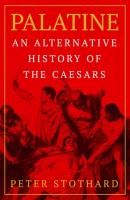
Weidenfeld and Nicolson (2023) h/b 336pp £22 (ISBN 9781474620994)
This month sees us all glued to the succession of the Windsors, a royal family continuing to grip us with its vicissitudinous cast and dramas. But the first dynasty that we know almost as well were the Julio-Claudians who ruled Rome for a century after the collapse of the Republic. In their succession too we find fascination in the intrigues, the courtiers, the excesses and the sudden deaths, as power transfers down the generations.
Fans of Peter Stothard’s previous books—On the Spartacus Road (2010), The Last Assassin (2020), and Crassus (reviewed here October 2022)—will need no urging towards his latest, a wonderfully evocative study of that dynasty, leading up to the fall of Vitellius in the Year of Four Emperors (AD 69). Palatine, like its predecessors, is imaginatively constructed from a series of realistic vignettes charting the imperial court from the last days of Augustus through to the arrival of the Flavians.
S. tells the familiar story in a very original way, making the two Vitellii his central characters: Lucius, three times consul and senior courtier to three emperors, and his son Aulus, eventually emperor for just eight final months. We hardly remember Vitellius now, perhaps not even the order of his immediate predecessors (will our grandchildren remember each of the Year of the Three Prime Ministers?), but it’s a brilliant device that illustrates how, with some paternal scheming, a relatively ordinary man could push his way through the corridors of power and emerge on top.
S. takes us right inside the imperial palace—the Palatine—painting a fly-on-the-wall picture of life under successive emperors. Adroitly dipping around the sources (and fully aware that not all of them are reliable), he takes us into the enormous building itself: its banqueting suites and bedrooms (and the connecting tunnels between them), the kitchens, pools and gardens of an ever-expanding court of relatives and mistresses, bureaucrats and slaves.
He luxuriates in the excesses. The libertine sexuality, deployed as often by the women, courtesans and wives, as by the emperors themselves. The sudden, lethal falling-out of favour—when so often immediate suicide was the required option. For successful courtiers flattery was as vital as efficiency. Vitellius’ father was a past master: invited to confirm to Caligula that he could see him talking to the moon, he replied that ‘gods were only visible to other gods’; to Nero, opening the Secular Games, a 100-yearly event, he hoped ‘May you often do it’.
Survival in the Palatine involved more than clever politicking: you had to respect the right auguries, avoid deliberate food-poisoning, and take the best medicines: sore throats were treated with a mixture of celery seeds, cinnamon, myrrh and the ‘ashes of over-cooked swallow’ or honey mixed with slave saliva. Leeks chopped in oil with chives helped Nero’s singing. And you also had to survive the gluttony: emperors might dine on lampreys stewed with coriander, duck scalded in its feathers with turnip, pancakes of fishes and thrushes’ breast, pike’s livers, pheasant and peacock brains, flamingo tongues.
Outside the palace walls, the first hundred years of Roman empire ran smoothly enough. There were issues with the corn and water supplies to the capital and occasional trouble at the frontiers, in Britain and Judaea. But we also get a sense of the growing importance of the empire beyond Rome: two of the final four emperors were first governors of Spain and Portugal, others served in Syria, Egypt and Africa. Major players were born outside Italy itself: Claudius and Germanicus in Lyon, Agrippina in Cologne.
Dynasties, even in modern TV series, don’t last for ever. The Julio-Claudian era collapsed in A D 69 because its emperors, enveloped in intrigue and excess, lost the confidence of the legions who were more interested in pay and housing. Under Vespasian and the Flavians the Palatine was re-organised and its excesses curbed but the court and similar bureaucracy survived until it all transferred to Constantinople in AD 330.
TV buffs will recall The Caesars (1968) and I, Claudius (1976) with Freddie Jones and Derek Jacobi respectively. This hugely readable novel-like account completes the picture, a Succession for the Julio-Claudian years. S. gets behind the Tacitean and Suetonian stereotypes and brings the Palace itself to life: a great read.
Sir Michael Fallon
Founder of the Parliamentary Classics Group
